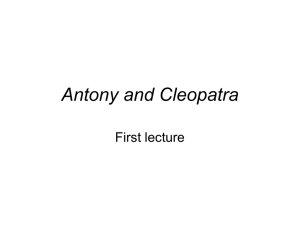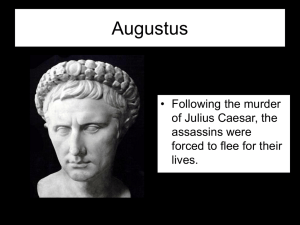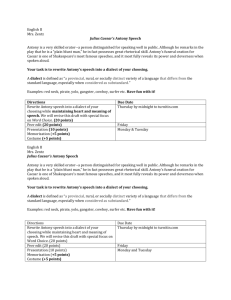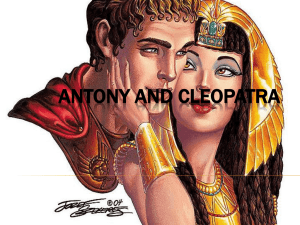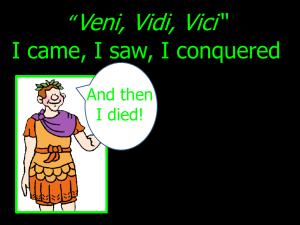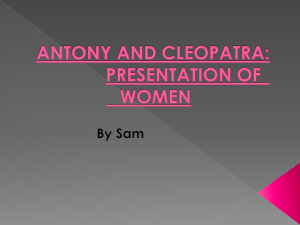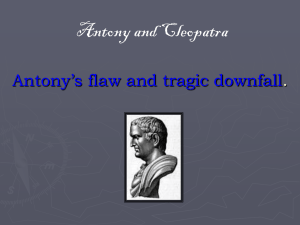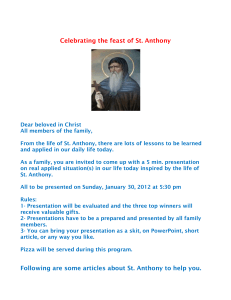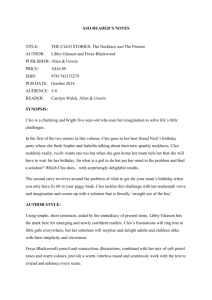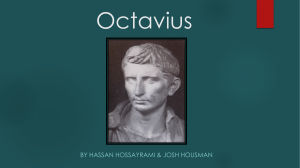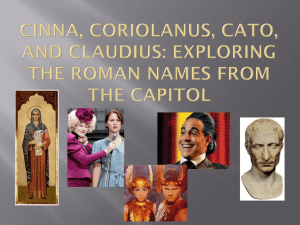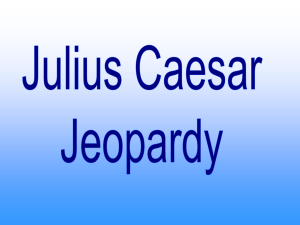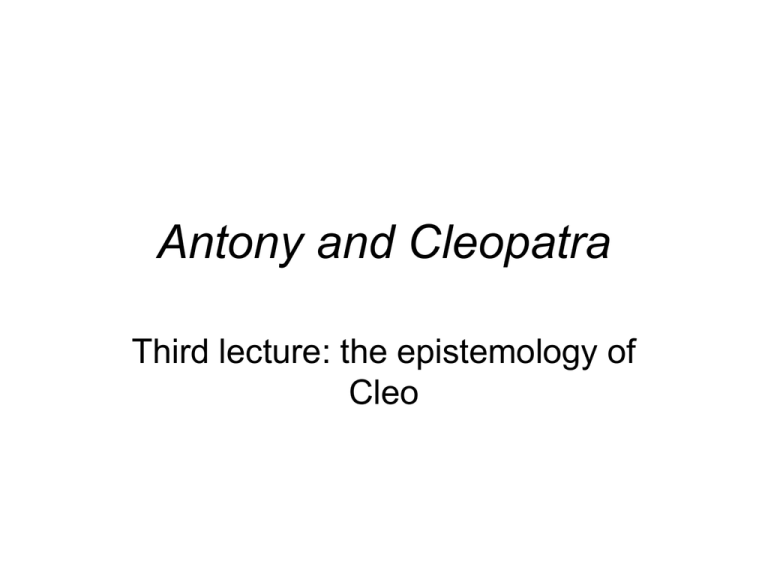
Antony and Cleopatra
Third lecture: the epistemology of
Cleo
The fourth dimension?
• With Enobarbus’ “death by thought,” we seem to
enter new territory.
• It goes along with the strange, rather mystical
stage direction, “Music of the hautboys is under
the stage.”
• What is this music?
• One asserts it’s “Music i’ th’ air.”
• Another that it’s “Under the earth.”
• Does it “sign well”? “No,” another replies.
• Is it the god Hercules leaving Antony?
• The only thing they agree on is that “’Tis
strange.”
• Do we ever know what this music means?
The last battle
• Antony’s squire is “Eros.” (As Macbeth’s was “Seyton?)
• Does all of the rhetoric of IV.4 lead us to expect Antony’s
victory? “The morn is fair,” etc.
• Similarly with IV.8: the language of the victory sounds
like ancient epic: “our gests.”
• “You have all shown Hectors.”
• Cleo’s greeting to him at ll. 16-18.
• Antony demands that Scarus kiss Cleo’s hand.
• And she promises him “An armor all of gold.”
• We seem to be in the world of epic, of “the story” as
Enobarbus had expressed it.
• Not in a world of sober historical events.
• As maybe Antony’s brief victory makes clear.
And the real last battle
•
•
•
•
•
•
•
•
•
•
Which Antony loses.
And blames entirely on Cleopatra’s treachery: IV.12.
Seems a repeat of his loss at Actium.
Antony in a towering rage: “This foul Egyptian hath
betrayed me.”
“Triple-turned whore!”
And he’s ready to kill her: “The witch shall die.”
What’s the truth of this?
Strangely, the play never tells us.
But she does, presumably without meaning to, trick him
into suicide.
Antony’s rage is only abated by Cleo’s report of her
death.
“Not know me yet?”
• Cleo’s question back in III.13, when Antony had found
her with Thidias and had him whipped.
• But it hangs over the rest of the play.
• What’s to know?
• The “epistemology of Cleopatra.”
• (Greek episteme, knowledge.)
• What can the characters know of Cleopatra?
• What can the audience know?
• Enobarbus’ betrayal of Antony seems in part to come of
his doubt of Cleo: at III.13 an aside: “Sir, sir, thou
[Antony] art so leaky/ That we must leave thee to thy
sinking, for/ Thy dearest quit thee.”
• But as he dies, he repents his betrayal of Antony, praying
to the feminine moon.
• And dies “of thought.”
• With Enobarbus gone, we’re on our own.
Without knowledge, what?
• Antony feels his identity melting: IV.14.
• “I cannot hold this visible shape,” he tells Eros.
• And the language is also sexual: he tells Mardian – the
eunuch! – “she has robbed me of my sword.”
• But Mardian insists: ll. 24-25.
• Can we know if this is true?
• What follows isn’t true: her “death.”
• So Antony is tricked into suicide?
• Again epic, legend, “the story”: “Eros, I come, my queen.
– Eros! Stay for me . . .” The realm of Dido and Aeneas.
• The comedy of Antony’s almost suicide.
• “April Fool!” Cleo’s not dead, just locked in her
monument.
• And Diomedes comes to bring “the truth.”
• The what?!
Should we give up on Cleo at this
point?
• After all, she won’t even leave her monument.
• But what follows is the strangest, and theatrically most
difficult, scene in the play.
• The actor playing Antony has be hauled up to the upper
stage.
• And Cleo’s language is both weirdly comic and sexual.
• Antony’s “Give me some wine, and let me speak a
while.”
• Even as he dies, Cleo seems to cajole and tease.
• “The soldier’s pole is fallen.”
• Her seeming death – will she die “of thought”?
• “No more but e’en a woman . . .”
• Are we ready to forgive Cleopatra?
But she still puzzles
• The Egyptian messenger: V.1
• Caesar’s intentions – and trickery.
• Cleo: “’Tis paltry to be Caesar:/ Not being
Fortune, he’s but Fortune’s knave.”
• And Proculeius too tricked?
• Does she intend to die?
• She tries – and vows at V.2, 49ff.
“I dreamt there was an emperor
Antony”
•
•
•
•
•
•
•
•
•
•
•
•
•
Cleo tells her dream to the treacherous Dolabella.
Her dream seems to create an Antony coterminous with the whole world.
And encompasses the sense of paradox we saw in Eno’s vision of Cleo on
her barge at Cydnus.
A’s bounty “grew the more by reaping.”
“His delights/ Were dolphinlike, they showed his back above the element he
lived in.”
Such a man possible?
“Gentle madam, no.”
“You lie . . . But if there be nor ever were one such,/ It’s past the size of
dreaming.”
Nature can’t compete with “fancy” (the imagination, thought of as a frivolous
– feminine -- power).
BUT even to imagine an Antony “were nature’s piece [accomplishment]
‘gainst fancy,/ Condemning shadows quite.”
The imagination, in this sense, is not frivolous, but a part of nature, i.e., not
just “fancy.”
This Antony existed, still exists.
Cleopatra – and Shakespeare – invent philosophic idealism?
Caesar and the game with
Seleucus
•
•
•
•
•
•
•
•
•
•
•
•
•
With Caesar, is Cleo up to her old tricks?
What about her vow of dying?
“Which is the Queen of Egypt?”
Is he blind?!
What does she intend with Caesar? She confesses the
frailties, “which before have often shamed our sex.”
And Caesar’s nasty threat.
Why does she call Seleucus to witness the truth of what
she’s listed of her wealth?
And why does he betray her?
Was she serious about trying to buy favor with Caesar?
Or was this a way to demonstrate something to him?
Seleucus a “soulless villain.”
But seems to make up to Caesar.
But sees through it all: “He words me, girls, he words me
. . .”
And Shakespeare’s game with us
• Cleo imagines the humiliation of being taken in triumph
to Rome, V.2, 210ff.
• “Mechanic slaves/ With greasy aprons . . .”
• As are watching in the Globe?
• “The quick comedians/ Extemporally will stage us, and
present/ Our Alexandrian revels; Antony/ Shall be
brought drunken forth, and I shall see/ Some squeaking
Cleopatra boy my greatness/ I’ th’ posture of a whore.”
• Which is, of course, what the Elizabethan audience was
watching.
• A challenge to the theatrical imagination analogous to
Cleo’s challenge to Dolabella?
• Our faith in imaginative power of theater?
• Our faith in Cleopatra?
Immortal biting/immortal longings
•
•
•
•
•
•
•
•
•
•
•
•
•
•
•
Cleo’s resolution – now “Roman” in a higher sense?
The malaproping countryman a marvelous conception.
The asp’s bite is “immortal.”
“A very honest woman, but something given to lie.”
“a woman is a dish for the gods, if the devil dress her not.”
“I wish you joy o’ th’ worm.”
And Cleo’s “immortal longings.”
“I am fire and air; my other elements/ I give to baser life.”
Mock jealousy of Iras.
The asp “the baby at my breast.”
Caesar notices she’s unchanged in death, looking as if “she would
catch another Antony.”
And Caesar is cheated of his triumph.
Says she and Antony are rather to be buried together: “No grave
upon the earth shall clip in it/ A pair so famous.”
And even Caesar has to admit that they’re just as famous as he is
(359-62).
Who wins?

